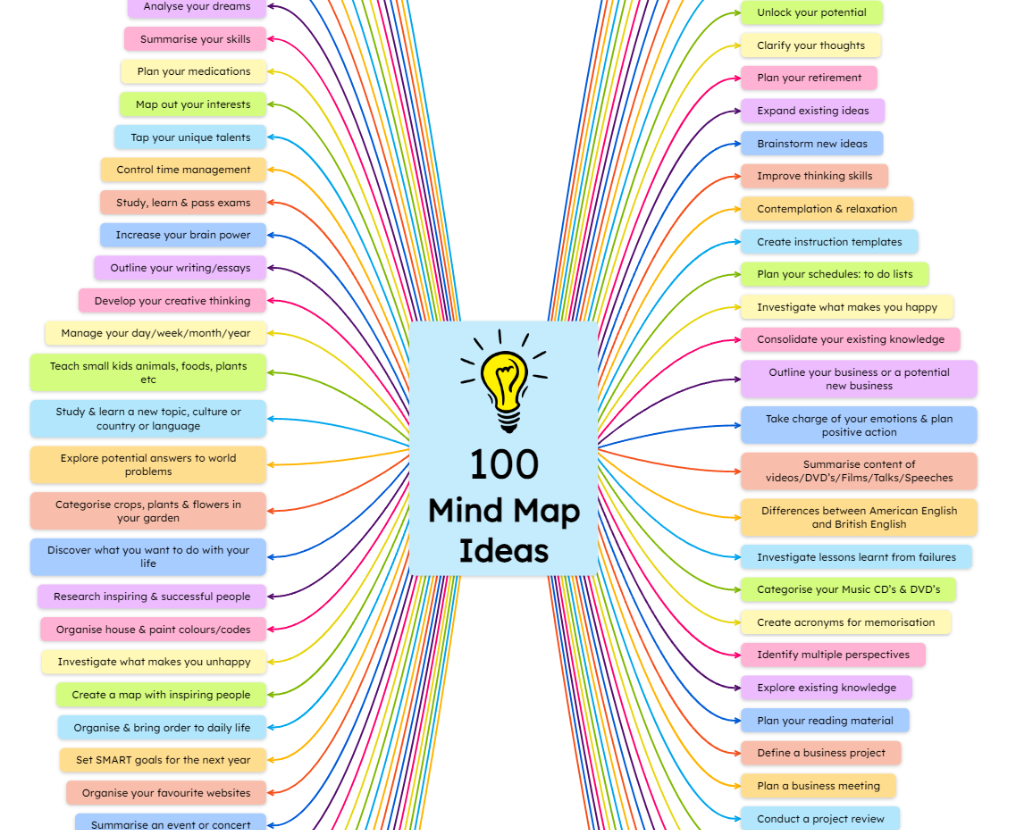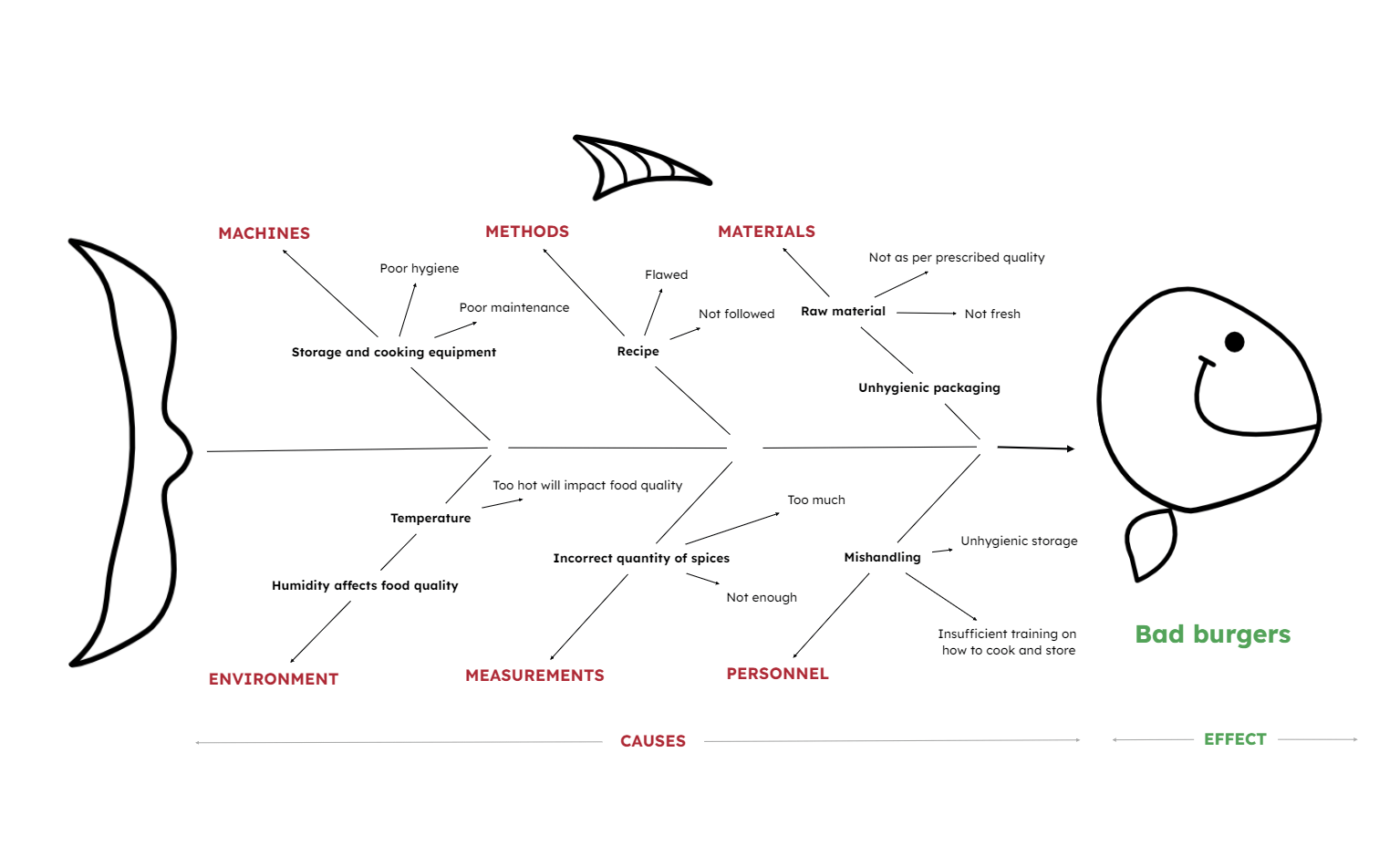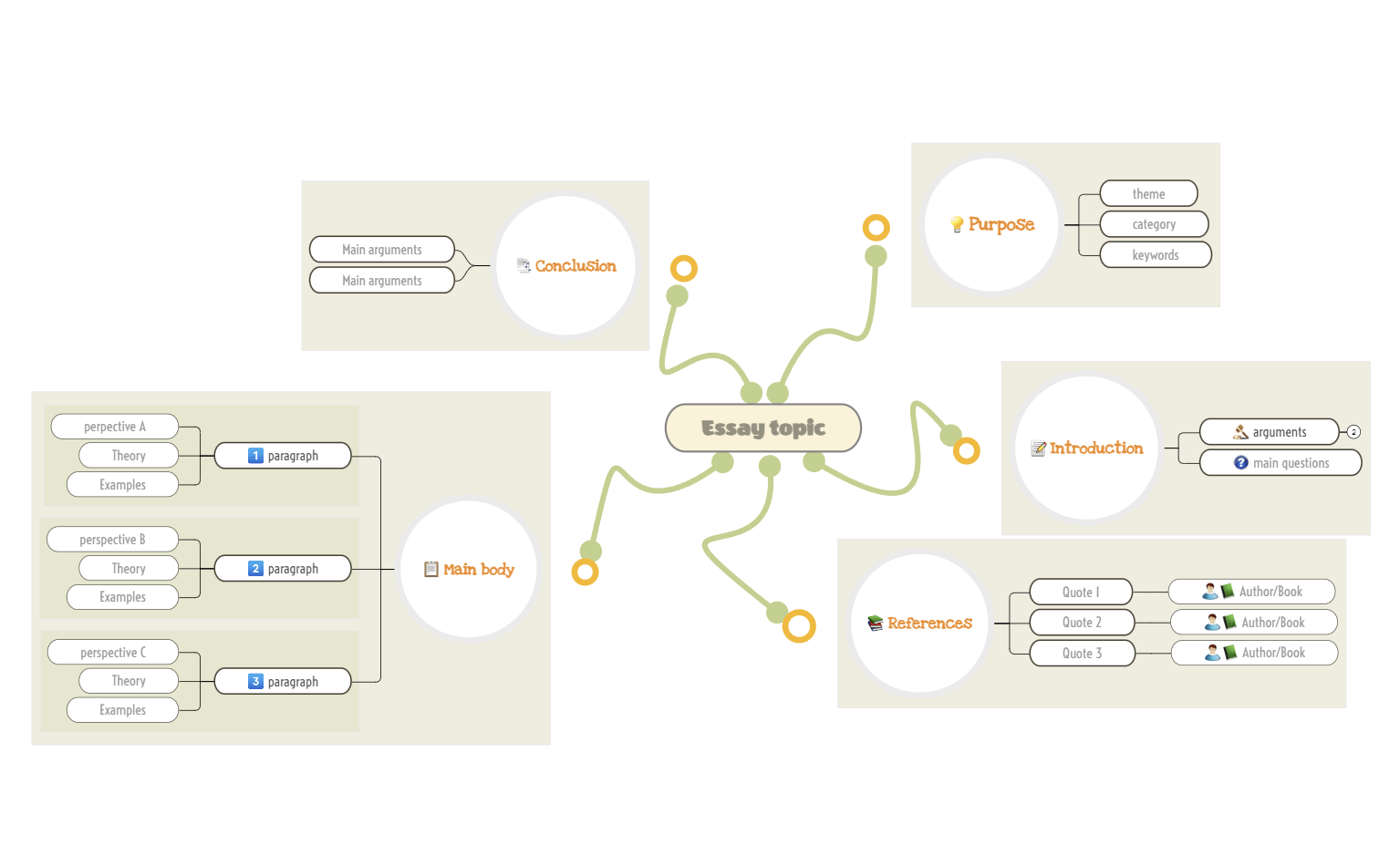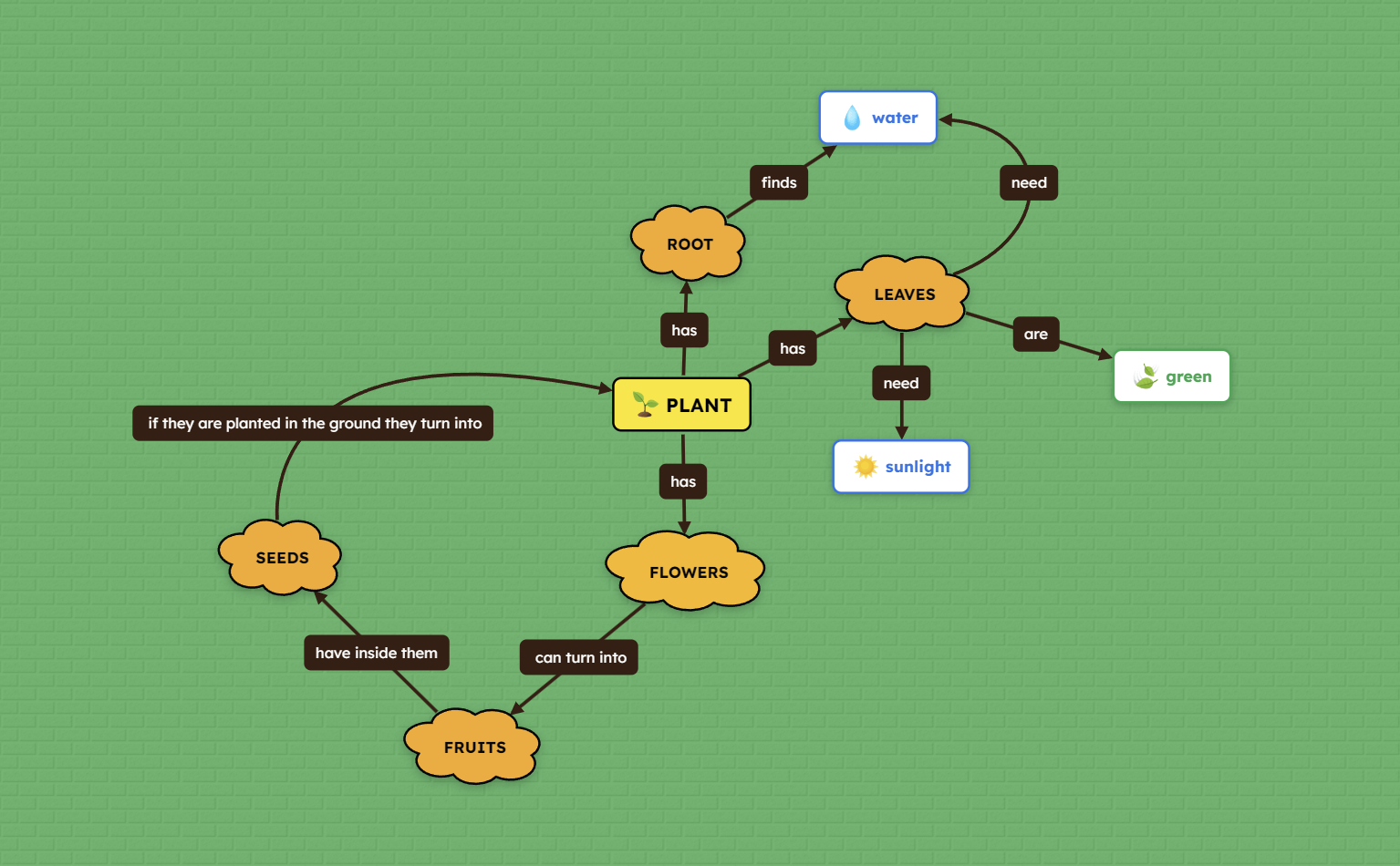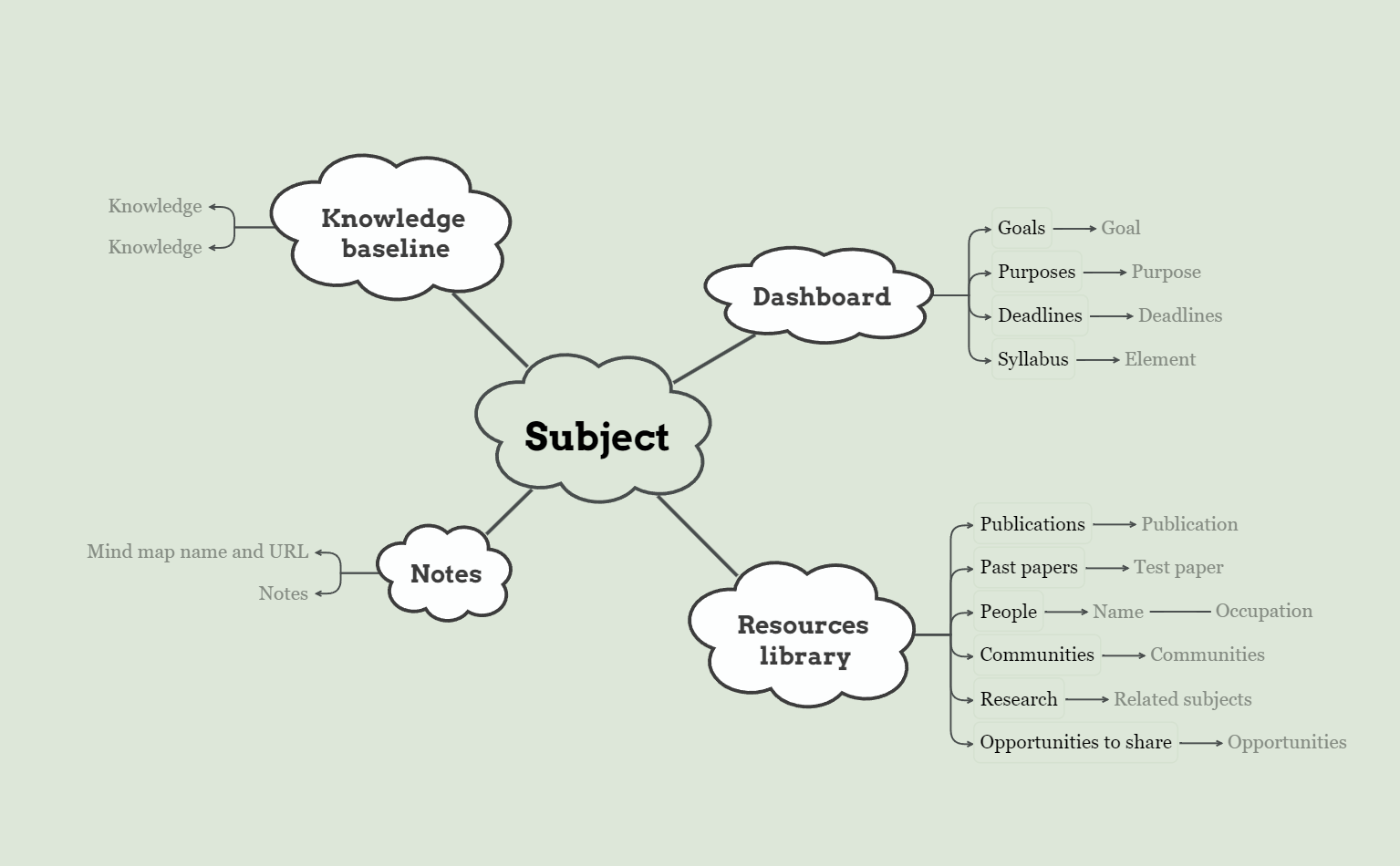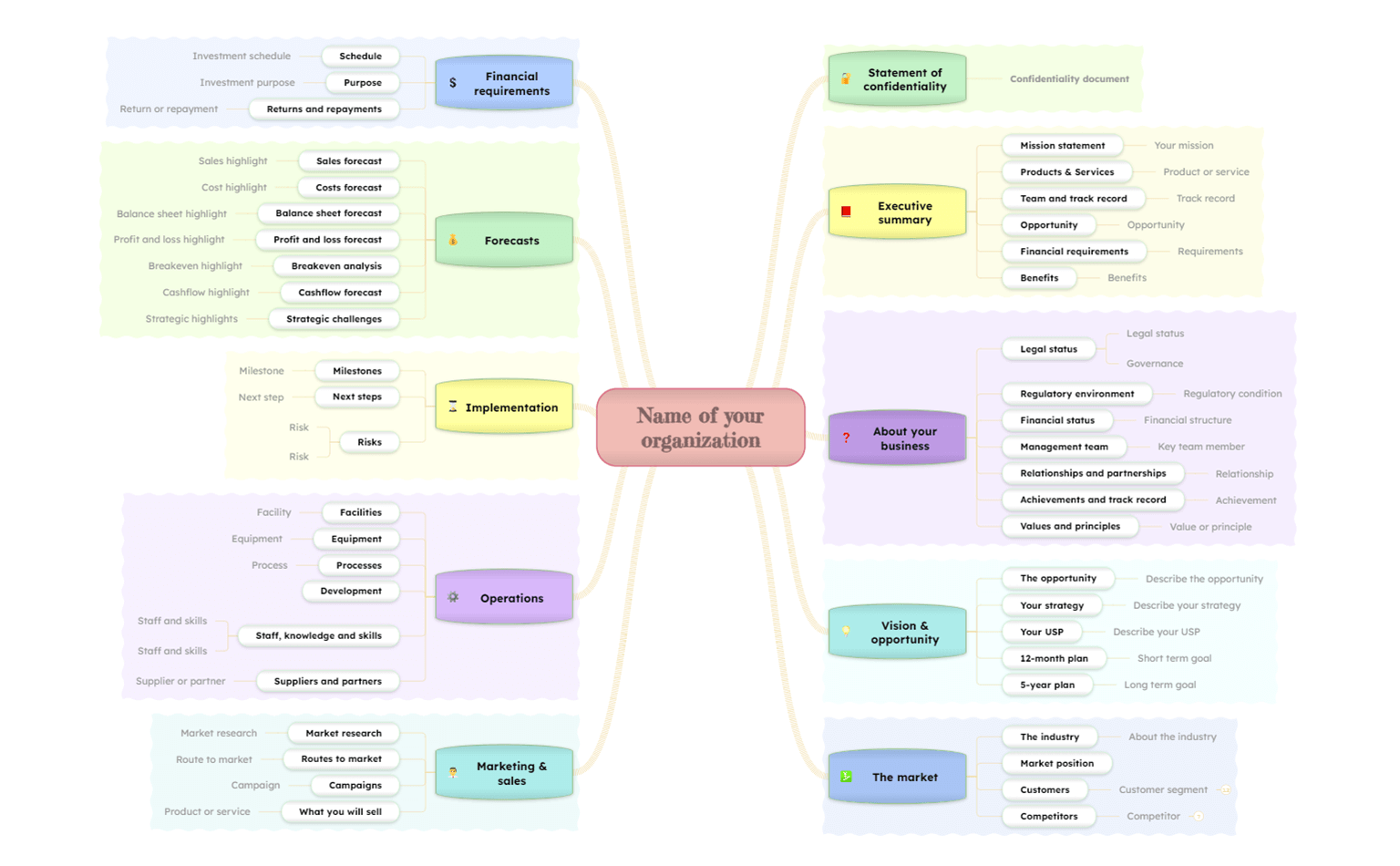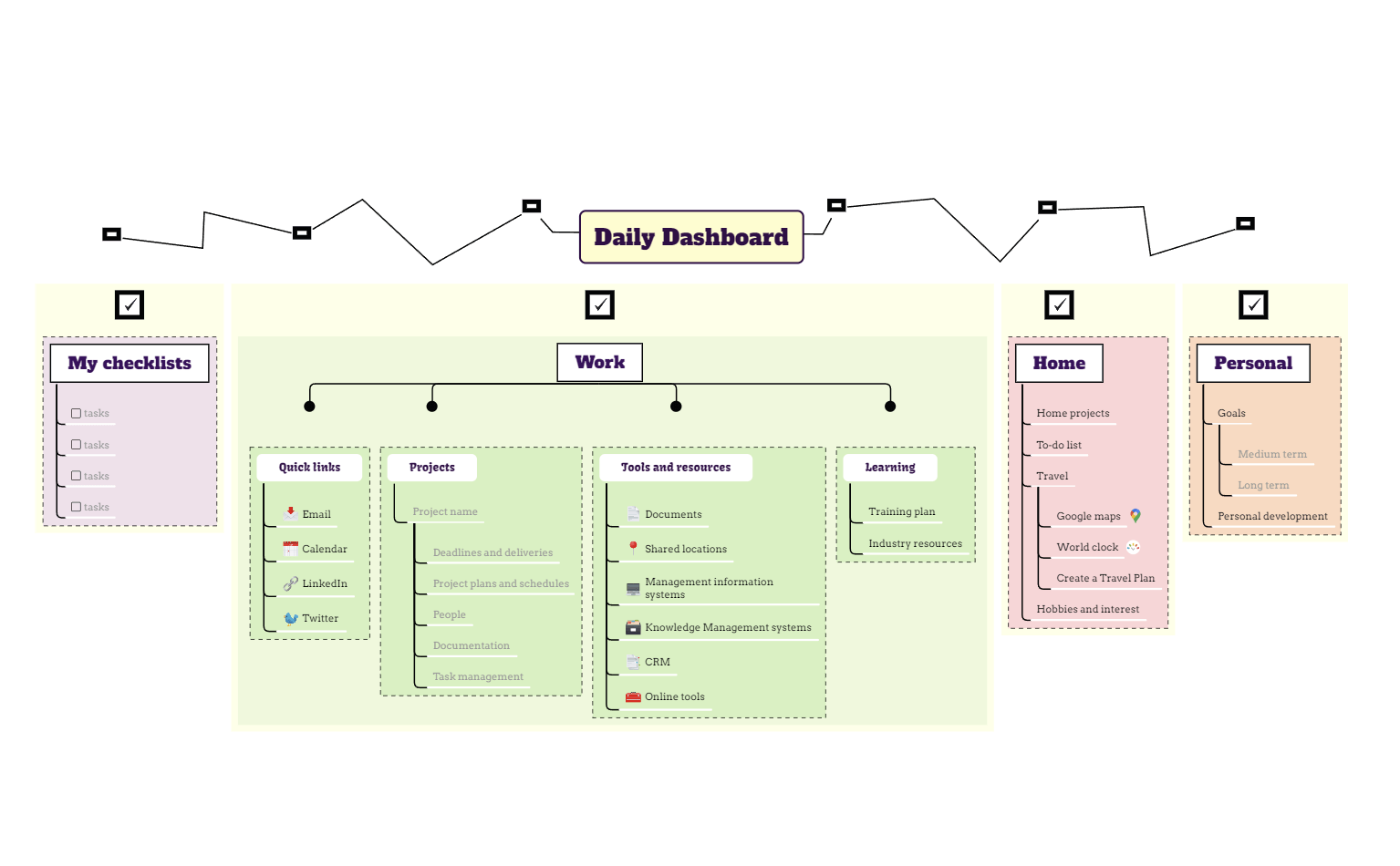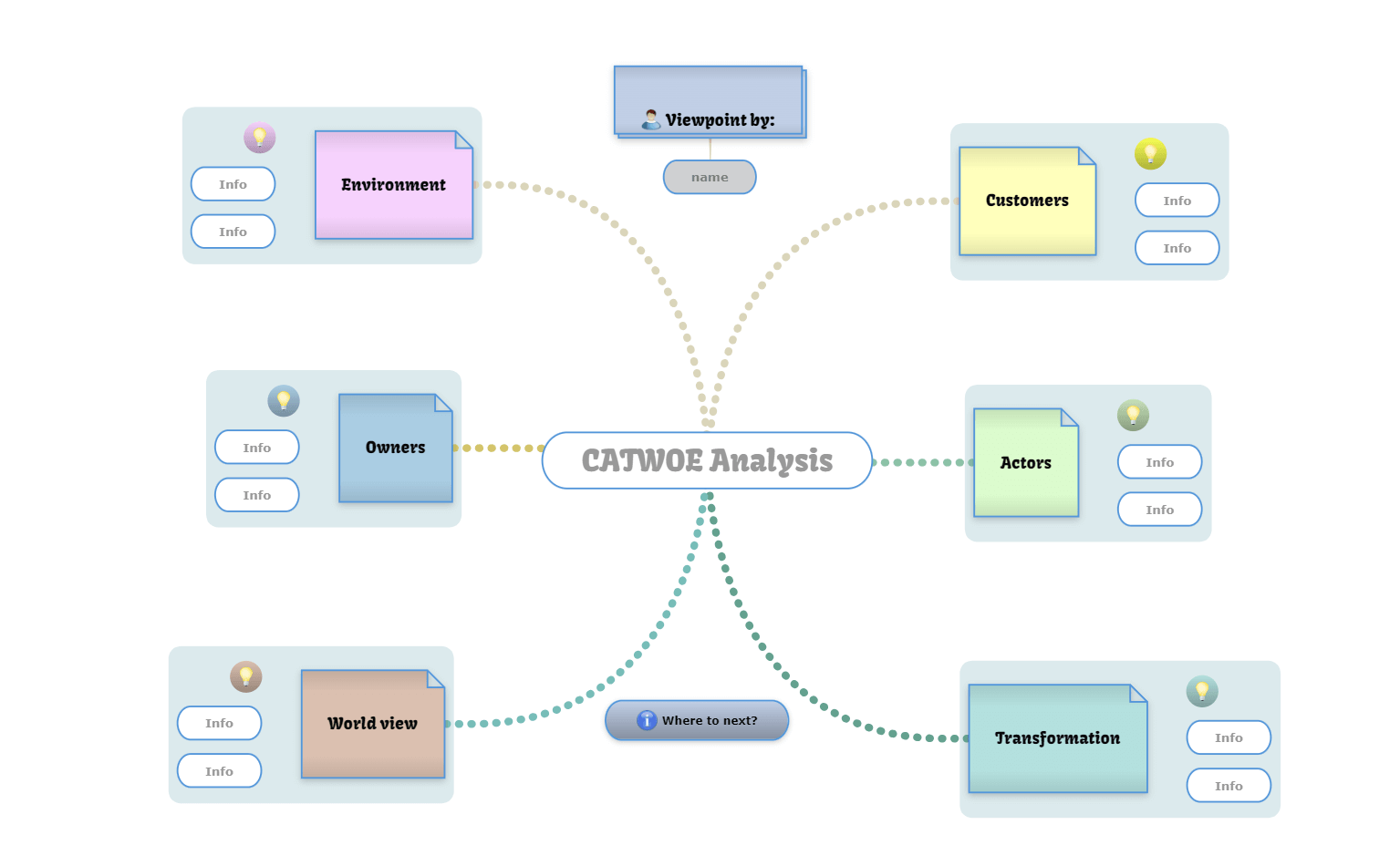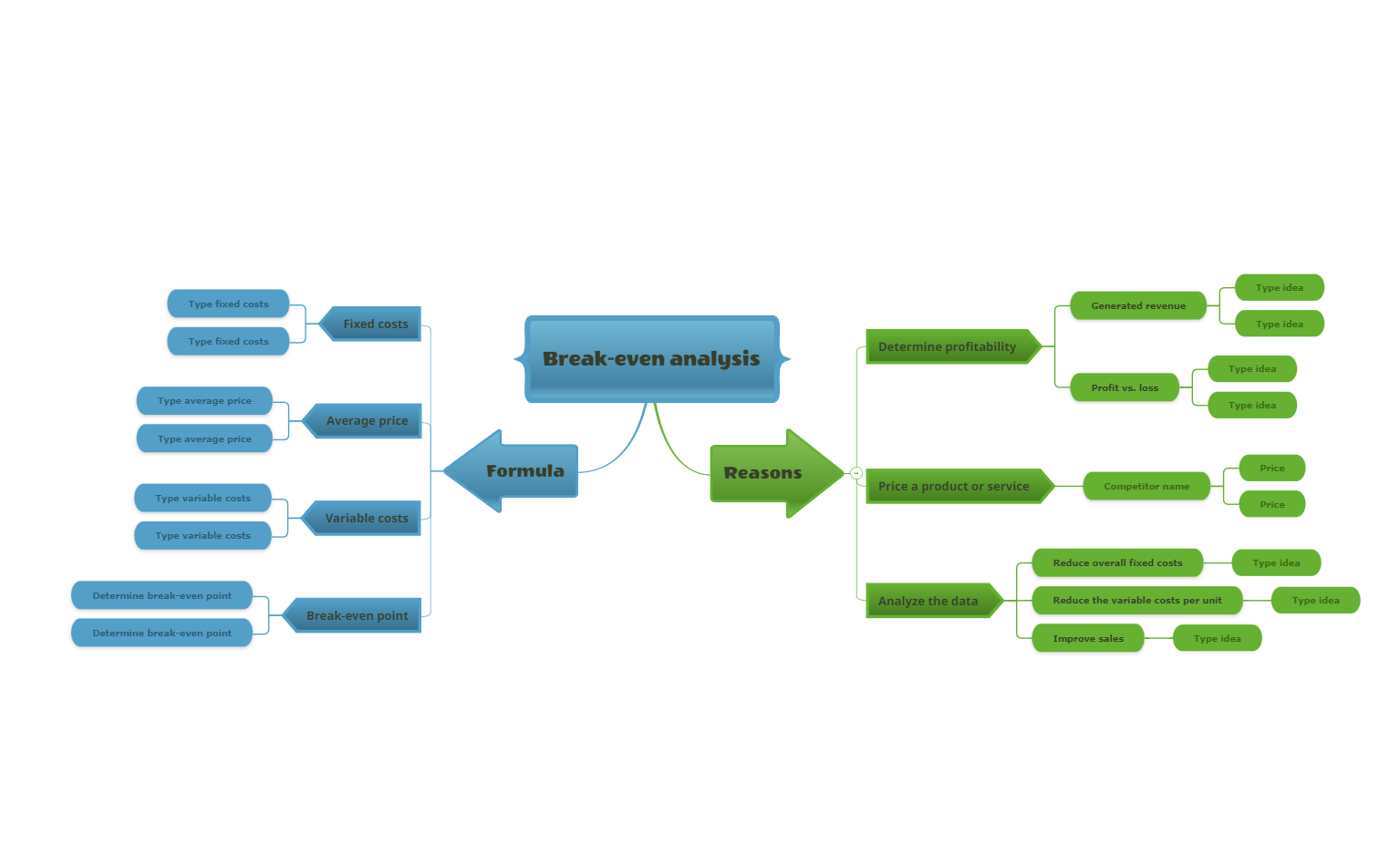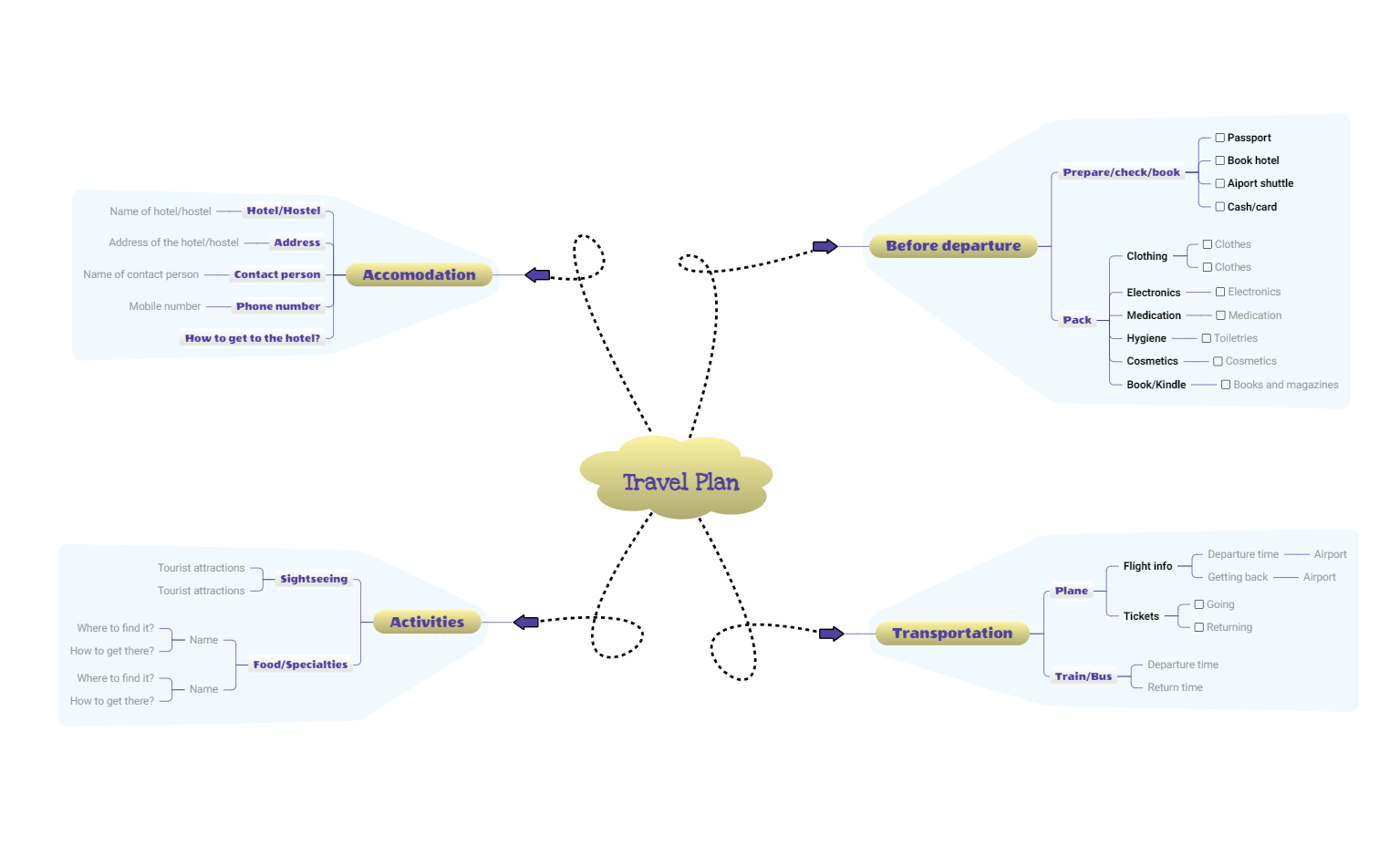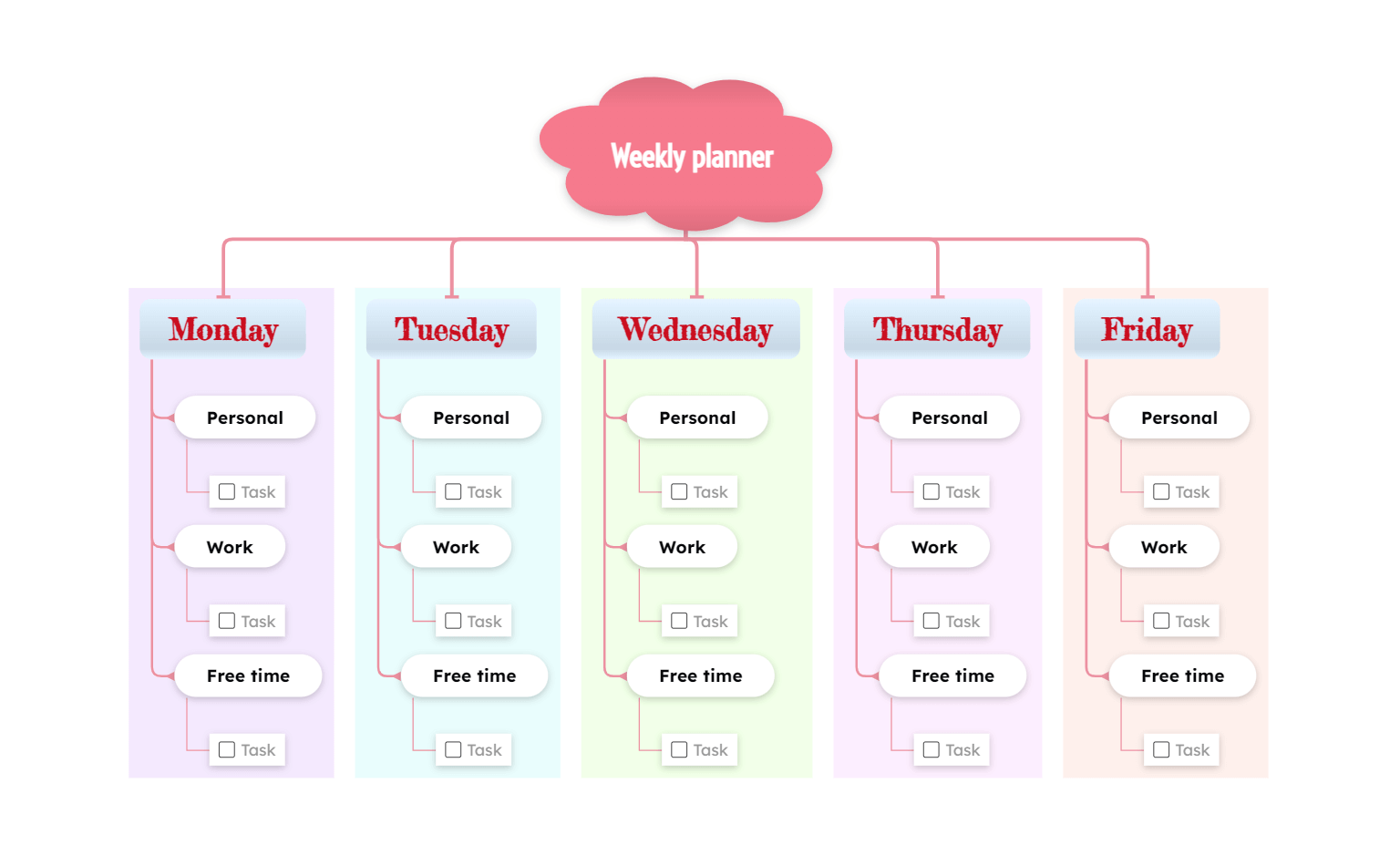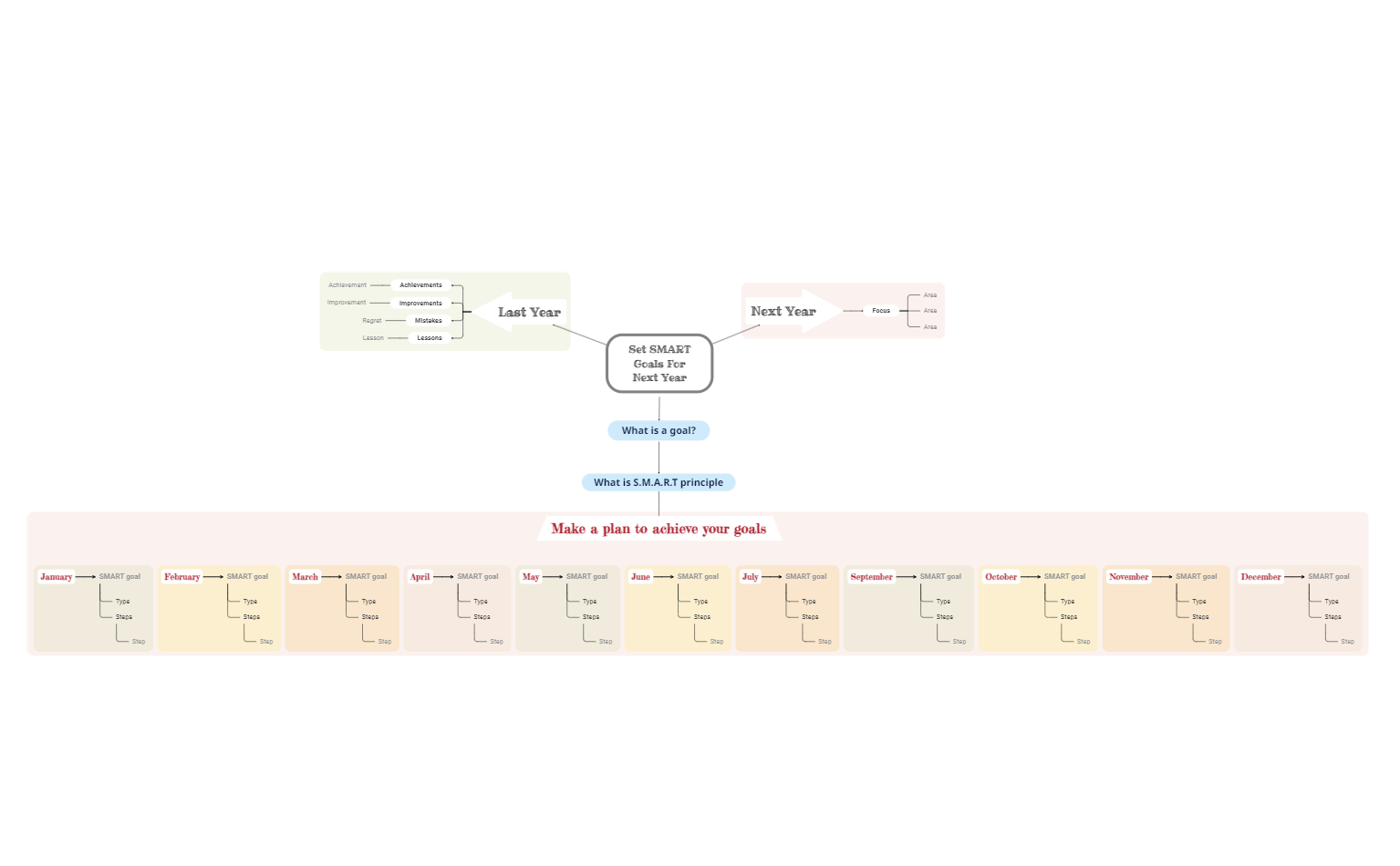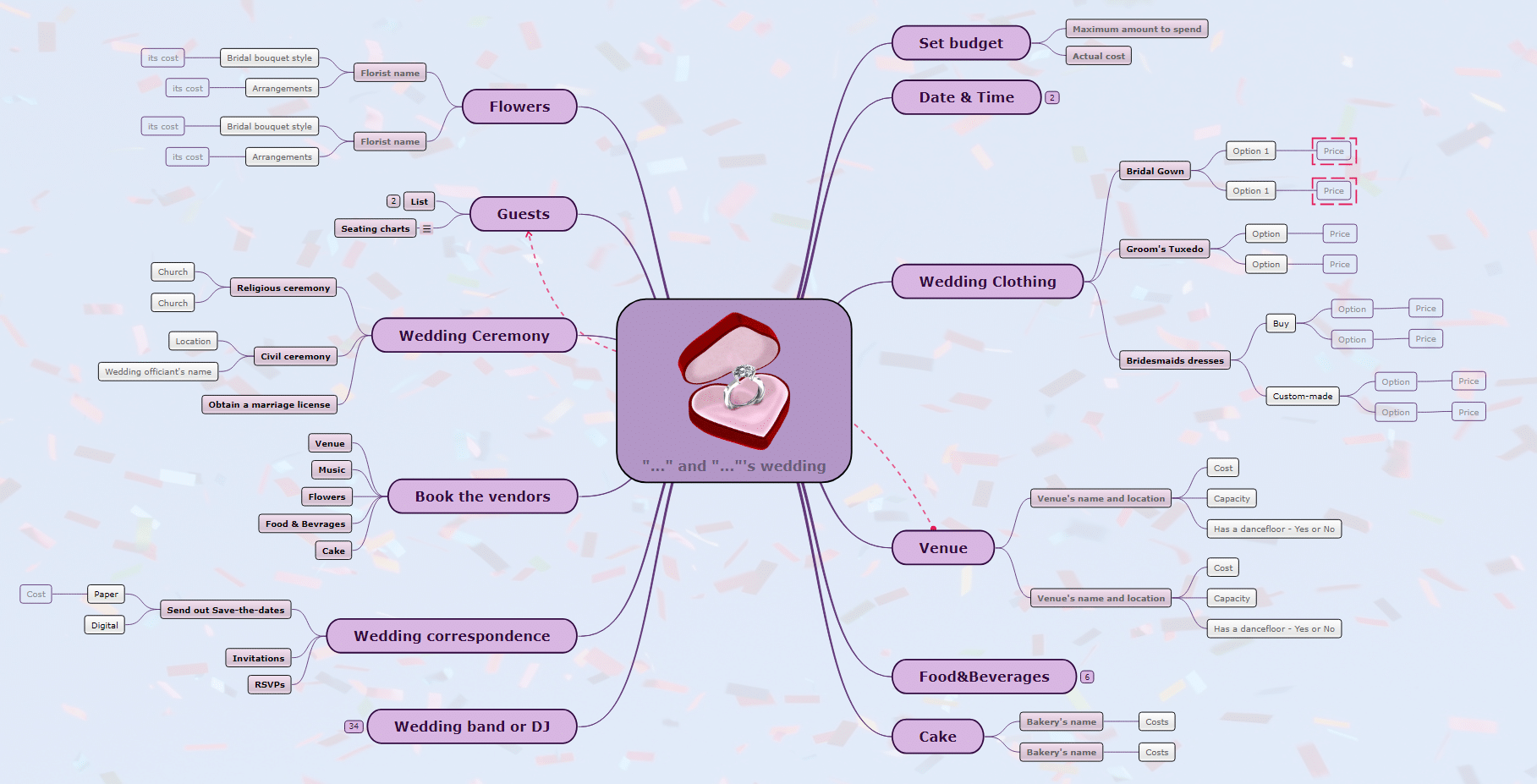100 Mind Map Ideas to Improve Yourself
Mind mapping is useful for more than just studying and outlining essays. There are many life-changing mind map ideas you can use in your daily life, business, personal development, and more.
Mind mapping is very versatile. Mind maps help you organize your ideas visually with ease, have a clear overview, and simplify any subject. Thanks to these characteristics they are a must in everyone’s life, starting from kids, students to entrepreneurs, marketing creators, teachers, and more.
How can you benefit from these visual diagrams and how to use them?
Mind map ideas for education
Try some of the mind map templates and concept map templates for education. Click on the green button to open the diagram, click on the File list menu – the 3 lines button), and then click on “Copy and edit“):
Mind maps and concept maps are great tools used in education. Both diagrams start from a central idea that is connected with related concepts or explains a subject. This structure is simple, using single words or short phrases to describe and develop any ideas.
Thanks to the simplicity of these diagrams, anyone can learn the basic mind mapping techniques easily, including kids. Tony Buzan has been teaching many children that the mind maps are the magic tool that help them in school. It is a great tool not only for taking notes but to understand and memorizing faster.
Moreover, being a tool that supports the illustration of ideas visually, you can add images and colors. Usually, the first topic contains a central image. “One image is worth a thousand words”, as they say.
This way, the imagination is stimulated and it’s easier for the brain to find connections with different concepts. Therefore, it easily generates new ideas. In other words, it boosts imagination and creativity.
In addition to the visual elements, the color palettes have an essential role. They make the mind maps and concept maps easily readable and they help the viewer understand the information better.
Moreover, the simple structure of a map improves memory. Studies showed that mind mapping is an effective method to improve retention. Being visual and using single words (keywords), it’s easier for the brain to memorize it, compared to plain text, for example.
To sum up, mind maps work perfectly for students and teachers, learning easier and faster, understanding any subject, and boosting their creativity. This technique works both by using predefined mind map templates and creating maps from scratch. Here are some ideas:
◼ Brainstorm ideas;
◼ Structure courses;
◼ Learning a new language;
◼ Learning a new culture;
◼ Study for exams;
◼ Structuring an essay;
◼ Summarize a book;
◼ Differences between American English and British English;
◼ Learn parts of speech;
◼ Pros and cons of a matter;
◼ Character development;
◼ Master a subject;
◼ Parts of speech;
◼ Introduction to syntax;
◼ 7 Continents of the world;
◼ Personal SWOT analysis;
◼ etc.
Mind maps for business
Choose from many more mind map templates (click on the button to open the diagrams, create a copy and edit your own):
A mind map tool can make your job easier and it can turn you into a more organized version of yourself. Time management is an important aspect when it comes to productivity. Create a mind map to organize, plan and schedule your tasks and projects.
Use mind mapping to develop a business strategy, a marketing action plan or to find new investors.
Online mind mapping allows you to share your maps with your team members and edit them in real time. Set tasks and collaborate. For example, you can create a mind map for project management with all the necessary steps.
You can use the mind mapping tool for more than time management. For instance, you can brainstorm ideas to develop a new product or structure important information. Moreover, mind maps work as a structuring tool where you can write and organize your ideas visually.
With a great mind mapping software you can start by building a creative mind map and then turn it directly into a Gantt chart. It is one of the most common tools for project management. This way you save precious time and you have everything in the perfect format.
You can simply brainstorm ideas or you can start using mind map templates or even concept map templates.
Ideas:
◼ To-do list;
◼ Marketing action plan;
◼ Problem solving;
◼ Design a business plan;
◼ Define a business project;
◼ Project review;
◼ Strategy mind maps;
◼ Pros and cons;
◼ Decision matrix;
◼ Effort vs impact;
◼ Business proposal;
◼ Evaluate a supplier;
◼ Plan a website;
◼ Plan a business meeting;
◼ Resource audit;
◼ Weekly planner;
◼ PESTLE analysis;
◼ Manage a risk;
◼ Stakeholder wheel;
◼ Plan a workshop;
◼ Force Field analysis;
◼ Ansoff’s Matrix;
◼ 5 whys root cause analysis;
◼ Evaluate a business strategy;
◼ etc.
Mind maps for personal life
Copy and edit a mind map or concept map template for personal purposes (click on the button to view the full diagram, the click on the 3 lines button, then select “Copy and edit” to create your own copy):
Online mind mapping can be a part of your new routine. It is more than a great tool for personal time management. A mind map is also a key element for personal development. Put your life in order, learn new things, invest time in your passions, and set goals. Create a mind map for each of these things and you’ll beat the procrastination. Moreover, when you have an idea mind map it and develop it.
Start a blog and plan your articles using a mind map or concept map template. Or just begin with a central idea or a even central image that inspires you and helps you generate new ideas.
Don’t forget to use the color palettes to differentiate topics or subjects you want to approach. The color palettes are also available for the text, lines, or background of your map. Customize it as you prefer to feel more inspired by the mind map design.
Mind maps work as great to-do lists. Add all you aim to achieve in the next week, for example, and set specific tasks. When you organize everything it’s easier to get things done.
The mind map design should be as simple as possible in this case. Try to use single words and short phrases to avoid a crowded list that won’t motivate you. Instead of adding too many tasks, focus on selecting your priorities. The mind map design can motivate you or demotivate you, so keep it simple.
If you have a new hobby or goal, try to build a creative mind map that will motivate you to keep it up and learn more things. Once you learn the basic mind mapping techniques, you’ll easily use this technique for anything you need. You can apply this technique when you are organizing your thoughts, learning a new skill, reading a book, making plans, or even setting new goals.
Ideas:
◼ Travel bucket list;
◼ Goals for the next year;
◼ Favorite quotes;
◼ Plan a wedding;
◼ Plan a party;
◼ Travel plan;
◼ Summarise your skills;
◼ Plan a blog;
◼ To-do list;
◼ Take decisions;
◼ Shopping list;
◼ Write recipes;
◼ Research inspiring & successful people;
◼ Home improvements;
◼ Workout plan;
◼ Organize your favorite websites;
◼ Create a CV;
◼ Create a journal;
◼ etc.
A mind mapping software is a great source of inspiration. Compared to the traditional mind mapping technique (with pen and paper), a digital tool has more advantages:
– It helps you create the maps fast;
– When you mind map online you can easily edit any map anytime, anywhere;
– All the maps are in one place and you can easily access them when you need them;
– You can collaborate in real time and edit them along with your colleagues or friends.
It gives you plenty of ideas on how to use the mind mapping tool in your everyday life and it offers you various mind map templates to inspire you.
How to create your own mind maps from scratch? Make your ideas stand out in 5 simple steps
There are many mind map templates available that can guide you through the process and give you many ideas. These are a great source of inspiration for many purposes, like work, school, or even personal life. It makes mind mapping very simple and easy to do, even if you’re a beginner.
However, if you want to be more original and to use your own imagination, you can have anything you dream about in one mind map. There are 5 simple steps you should follow to organize information like a pro in your own mind maps:
Step 1: Start with the main idea
The very first thing you should have in your head when you create your mind map is the central idea. This is the starting point, representing the topic that you’re going to develop. Think about a simple and short phrase or even one word that expresses what this mind map is all about. It’s important to be short and suggestive.
“A picture is worth a thousand words”, they say. Therefore, don’t limit yourself only to words, use a suggestive image in the central topic and make it the center of your mind map. Using an eye-catching visual representation of the main concept draws a lot of attention to it and it triggers your imagination at the same time. This way it will be easier for your brain to find associations.
Step 2: Add more connected ideas
After you establish the subject of your diagram, it’s time to develop it adding more relevant topics. Think about these topics as being children topics of the central idea. Depending on what you chose to be the main idea, these topics can be subdivisions, types or connected concepts. Remember to add them using single words or short phrases. Think about keywords and avoid long phrases because this way your brain will be able to find a bigger number of associations.
For example, if it’s a brainstorming mind map you will add anything that crosses your mind related to the central idea, not necessarily types or subdivisions. However, if your diagram it’s a biology course structure about animal classifications, you can add all types of animals.
Step 3: Add more subtopics
Now that you have the first level of the mind map, it’s time to develop it. Do the second step once again for each topic, adding relevant ideas or information. The beauty of mind mapping is that there’s no limit to your imagination and your creativity. You can add an infinite number of ideas. It’s easily editable, it keeps an organized layout and you can find anything at a glance.
For example, if you’re using mind maps to plan events or work-related activities, you can always modify some details. At these types of matters, there are always changes and unexpected things, but the mind mapping structure brings you more clarity in all the aspects you’re writing there. You’ll be more organized and more creative with everything you’re doing.
Step 4: Unleash your creative spirit
Let your creativity take over the situation. Take advantage of using different colors, shapes, lines, sizes, fonts or any visual element. Play with them, add more suggestive images and give life to all your ideas.
Doing this visual adjustment will make a huge difference in your diagram. You can make a test comparing the before and after applying this step. You’ll definitely notice that your visual memory will act better after you add all the visuals. You’ll retain more of what you wrote and that visual image won’t vanish from your brain. You don’t only become more creative, you boost your memory at the same time.
Step 5: Share your mind map with others
The last step is optional, but it can make all the process more fun and engaging. Share your mind map with your colleagues, co-workers or friends. Why? Because “two heads are better than one”. You can complete one another and have an amazing result using ideas from more people. Collaborate with people on your maps and put all your ideas together.
It’s that simple to create a visual mind map. Read Mindomo’s blog posts to gen more ideas, tips, and tricks about mind mapping, productivity, and efficiency.

